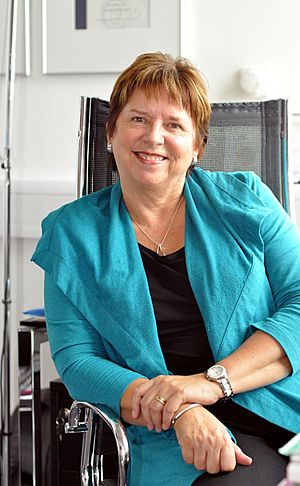Wendy Hall facts for kids
Quick facts for kids
Wendy Hall
|
|
|---|---|

Hall in 2011
|
|
| Born |
Wendy Hall
25 October 1952 London, England, UK
|
| Education | Ealing Grammar School for Girls |
| Alma mater |
|
| Known for | Web science |
| Spouse(s) |
Peter E. Chandler
(m. 1980) |
| Awards | Suffrage Science award (2016) |
| Scientific career | |
| Fields |
|
| Institutions |
|
| Thesis | Automorphisms and coverings of Klein surfaces (1977) |
| Doctoral advisor | David Singerman |
Dame Wendy Hall, born on October 25, 1952, is a very important British computer scientist. She is known for her work on the World Wide Web and how we use information online. She is a special professor of Computer Science at the University of Southampton.
Contents
Early Life and Education
Wendy Hall grew up in west London, England. She went to Ealing Grammar School for Girls. After school, she studied mathematics at the University of Southampton. She earned her first degree in 1974 and her PhD (a very advanced degree) in 1977. Later, she also got a Master's degree in Computing from City University London.
Wendy Hall's Career in Computing
Wendy Hall returned to the University of Southampton in 1984. She joined a new group that focused on computer science. Here, she started working on multimedia and hypermedia. Hypermedia is like a super-powered version of hypertext. It connects different types of media, like text, images, and videos, through links.
Her team created a system called Microcosm. This was even before the World Wide Web became popular! Microcosm was so good that it became a company called Multicosm Ltd.
Innovations in Hypermedia Systems
Wendy Hall and Hugh Davis led a research group at the University of Southampton. They developed several important systems for linking information. These systems were created when hypertext and database systems were just starting.
Some of their key creations included:
- Microcosm (1994): This system used special "link services."
- Distributed Link Services (1995)
- Multicosm (1998)
- Portal Maximizer (2001)
These systems used a separate server to store links. Imagine a special database that holds all the connections between different parts of documents, like Word files or PDFs. This meant you could update and manage links separately from the documents themselves. It was a very flexible way to organize information.
In 1994, Wendy Hall became the first female professor of engineering at the University of Southampton. From 2002 to 2007, she was also the head of the School of Electronics and Computer Science.
Founding Web Science
In 2006, Wendy Hall helped start something very important called the Web Science Research Initiative (WSRI). She worked with Tim Berners-Lee, who invented the World Wide Web, and other experts. The WSRI is now known as the Web Science Trust.
This group aimed to study and understand the World Wide Web. They wanted to know how it grew and how it affects society. Their work helped create a new field of study called Web Science. Wendy Hall is now the executive director of the Web Science Trust.
Leadership Roles
Wendy Hall has held many important leadership positions. She was the President of the British Computer Society from 2003 to 2004. She also led the Association for Computing Machinery from 2008 to 2010. Since 2014, she has been a Commissioner for the Global Commission on Internet Governance.
In 2017, she was named a Regius Professor of Computer Science at the University of Southampton. This is a very special title given by the King or Queen. In 2020, she became the Chair of the Ada Lovelace Institute. This organization focuses on the ethical use of data and artificial intelligence.
Since 2022, Wendy Hall has been the Editor-in-Chief of Royal Society Open Science. She also chaired the Royal Society Publishing Board from 2017 to 2022.
Awards and Recognition
Wendy Hall has received many awards and honors for her amazing work.
- In 2000, she was made a Commander of the Order of the British Empire (CBE).
- In 2009, she was promoted to Dame Commander of the Order of the British Empire (DBE). This means she can use the title "Dame" before her name.
She also has honorary degrees from several universities, including Oxford Brookes University and Cardiff University.
In 2000, she became a Fellow of the Royal Academy of Engineering. In 2009, she was elected a Fellow of the Royal Society (FRS). This is one of the highest honors a scientist can receive in the UK.
Her nomination for the Royal Society praised her for understanding how people interact with large online information systems. It also highlighted her work in developing Web Science. This new field helps us understand how the web changes and how to build its future.
In 2006, she won the ABIE Award for Technical Leadership from the Anita Borg Institute. In 2010, she was named a Fellow of the ACM for her contributions to the semantic web and Web Science.
In 2013, she was recognized as one of the 100 most powerful women in the United Kingdom by BBC Radio 4. In 2016, she won the Suffrage Science award.
Personal Life
Wendy Hall is married to Peter Chandler, who is a physicist.
See also
 In Spanish: Wendy Hall para niños
In Spanish: Wendy Hall para niños
 | Claudette Colvin |
 | Myrlie Evers-Williams |
 | Alberta Odell Jones |

